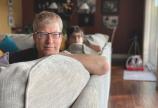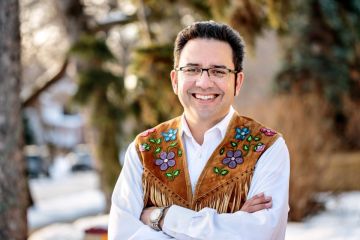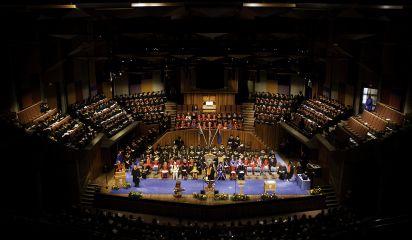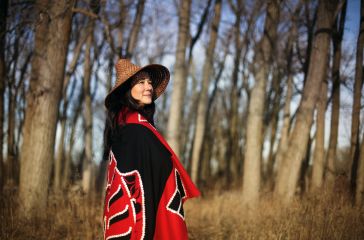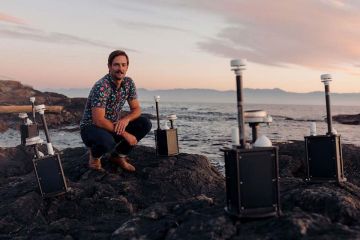California greening
- Matt O'Grady
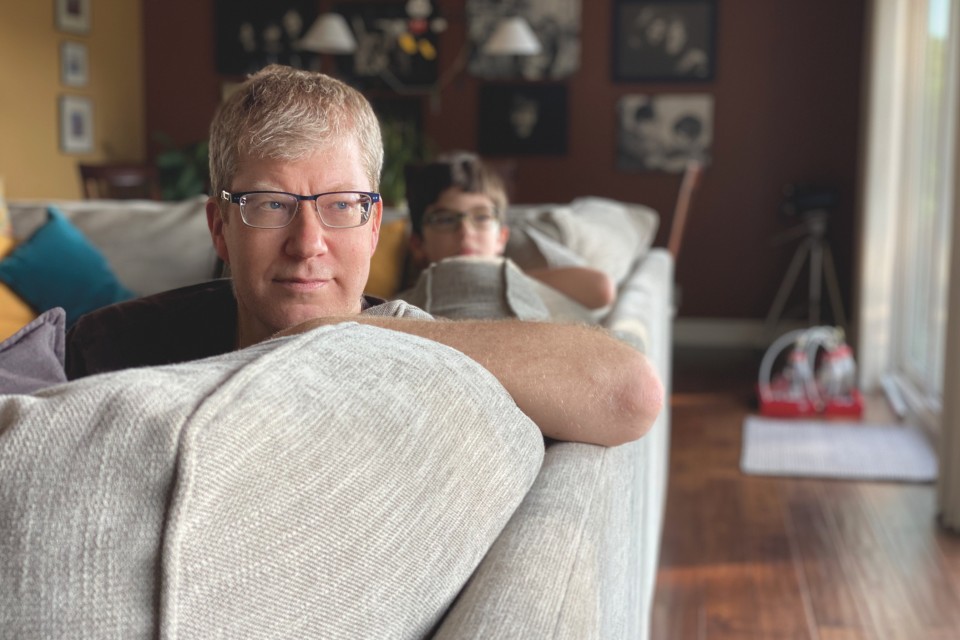
When it comes to California, there tends to be two types of immigrants: those who’ve known their whole lives they were destined for the bright lights of Hollywood or the tech buzz of Silicon Valley. And then there are those who find themselves there on vacation—and are captured by the glow of the Golden State.
Tyson Woeste (BEng ’02) falls into that latter category. After graduating from UVic with an engineering degree, Woeste immediately went to work as a product engineer in Maple Ridge, BC, at the North American headquarters of E-One Moli Energy, one of the world’s leading lithium-ion battery manufacturers. Then in March 2004, Woeste and two friends from UVic (Steve Knoke, BA ’01, and Erik Garrett, BSc ’02) decided to take a two-week road trip down to Mexico’s Baja California. They drove in shifts down the coast before finally stopping for their first night at Manhattan Beach in Los Angeles.
“We had all spent time while at UVic surfing at Jordan River and Sombrio—and so we kind of fancied ourselves as surfers. We hatched a plan: drive from Vancouver to Cabo San Lucas and back—and camp/surf along the way.”
—Tyson Woeste
“We stayed and surfed for a couple days, and it was here that I was captivated by the California Dream: that you could live on the beach and chase a career in a place with perfect weather.” When Woeste returned to Vancouver, he spent the rest of that spring and summer figuring out how he could move to Los Angeles. He decided the best way was as a student, and so he applied to UCLA and got into its MBA program, moving down in the spring of 2005.
Woeste has been in LA ever since—working for a variety of tech companies (including virtual reality start-up Transported, which he co-founded in 2015). More recently, he joined LA’s Fifth Wall Ventures as a partner, launching the Climate Tech Fund in 2019 to invest in decarbonization, sustainability and climate-friendly technologies for the real-estate industry. (Woeste left Fifth Wall in 2021, but continues to invest in the clean-tech space.)
He says his move from engineering to venture capital was driven by the realization that “the real forces that would drive and shape civilization’s transition to a sustainable energy future were those of business, capital allocation and politics.” And for him, California was the place where all of that came together; the sunny skies and good surf were a nice bonus.
Clean energy foundations
Still, on reflection, Woeste traces everything he’s done throughout his career—especially his focus on clean-tech—back to UVic Engineering.
“There were basically two people who were quite transformative for me: David Sanborn Scott and Ged McLean,” says Woeste. Scott had founded UVic’s Institute for Integrated Energy Systems (IESVic) to focus on fuel-cell systems, cryofuel liquefaction and energy-systems analysis, while McLean served as IESVic’s executive director during Woeste’s undergrad years. Scott was also working on a book at the time, called Smelling Land: The Hydrogen Defense Against Climate Catastrophe, and Woeste recalls how he would use his class to get feedback on early manuscripts.
“So you had this subject matter, which [Scott] specialized in, as well as this passion to design energy systems that were low carbon. Even to this day, my basic guiding assumptions about how everything works and how we should fix it are his orientation.”
— Tyson Woeste
Over the past 30 years, UVic has developed a stellar reputation for its work in climate science—and through the mentorship of teachers such as Scott and McLean, a generation of graduates have infiltrated technology and venture capital, looking to change the world. And more than one of them have moved to California to make that happen.
Raising capital to lower carbon
Aaron Fyke (BEng ’95) is the founder of Thin Line Capital, an early-stage venture capital firm based in Pasadena that invests in companies working to solve climate challenges in energy, water and food sustainability.
This year, Fyke is celebrating 20 years in Los Angeles. “For what I want to do in clean energy, California has been a long-time world leader, and I’m really proud to be part of that story. However, maintaining my ties to Canada has been important to me. Canada has been aggressive at pursing policies that are much more focused on climate change. On a national scale, Canada is implementing a lot of things that the US doesn’t have.”
Still, the sheer size of LA has allowed people like Fyke and Woeste (whose paths occasionally cross) to carve out a niche in clean-tech investments, right in the heart of car culture. According to data firm Pitchbook, there were $6.4 billion USD in Southern California “climate tech” deals in the first 10 months of 2021—twice as much as for all of 2020.
“If Silicon Valley, if the Bay Area, didn’t exist, LA would be considered this massive beacon of activity for startups—but because it is there, LA is somewhat in its shadow. But I have no desire to move to the Bay and be one of hundreds of funds chasing deals.”
— Aaron Fyke
IESVIC’s lasting influence
Originally Fyke planned to pursue a degree in physics at UVic, but after his first year, he realized he didn’t want a career in research. “When I transferred into engineering that fall, one of the second-year classes was thermodynamics, taught by David Scott,” recalls Fyke. “Almost immediately, I was like, ‘This is exactly what I should be doing.’”
Scott became an important mentor to Fyke, leading to his chance to work at IESVic as the first undergrad involved during the organization’s founding. The result of their collaboration led to a paper in the International Journal of Hydrogen Energy, and a continued lifelong friendship. Upon graduation, Fyke took a job at BC Research Inc. working on electric vehicle and transportation technologies, followed by three years at Burnaby clean-tech pioneer Ballard Power Systems.
Eventually, Fyke decided to take on bigger business challenges—and moved to Boston in 2000 for an MBA at MIT. He planned to return to Ballard, but when he graduated in 2002, North America was in a recession—and Ballard was struggling—so Fyke searched further afield for jobs, eventually landing in an LA-based company developing a solar-powered, fuel-cell hybrid airplane. That job, with AeroVironment, launched his clean-tech career in California, which has included stints in management (as co-founder and CEO of Heliogen, a solar-tech company backed by, among others, Bill Gates) as well as venture investments.
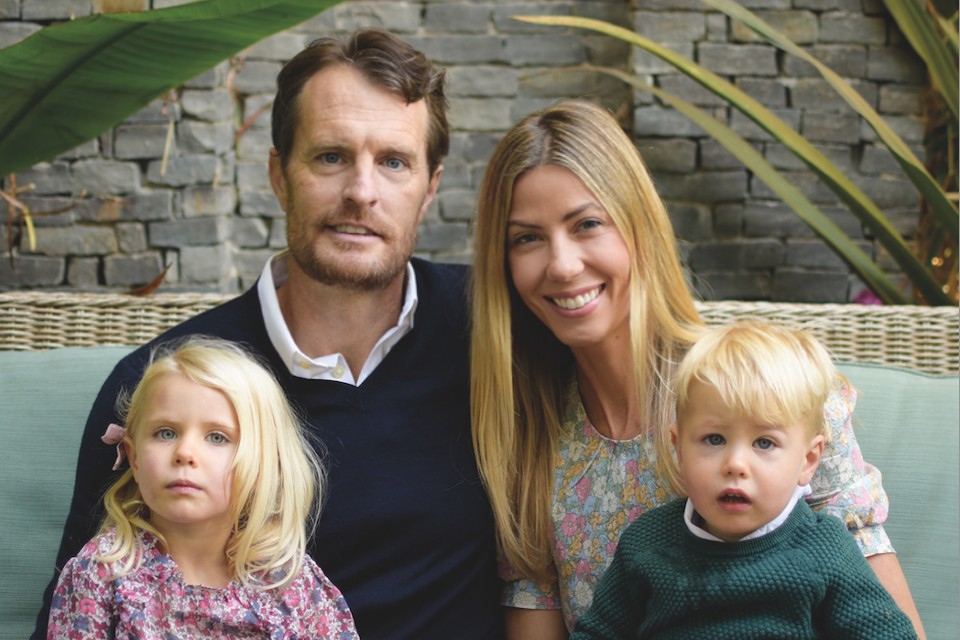
Tyson Woeste with his wife, Laura, and children. Photo courtesy of Tyson Woeste.
Fyke says he’s proud to have played a part in growing LA’s small-but-vibrant venture-capital scene. And he loves the life he has built there with his wife (a Colombian émigré he met in LA) and two kids, ages 11 and 13. He embraces the international flavour of the city of 10 million, with its mix of cultures and cuisines, and says he’s even enjoyed the odd brush with celebrity. “I met ‘Bill Nye the Science Guy,’” says Fyke. “The Planetary Society, of which he was president, has its headquarters here in Pasadena.”
Tyson Woeste, for his part, says he’s very much adopted the Southern California lifestyle. He married a volleyball player from Orange County, and now lives with his wife and two young children (ages two and three) in Marina Del Ray, a beachside community just up the coastline from where he first landed in 2004.
As for the surfing that lured him south? Well—the passion remains, says Woeste, but he isn’t catching as many waves as he used to: “Not with two kids—not even close. But one day—one day—I’ll get back.”
Photos
In this story
Keywords: alumni, clean energy, sustainability, engineering, research, business, industry partnerships, entrepreneurship
People: Aaron Fyke, Tyson Woeste, Steve Knoke, Erik Garrett, David Sanborn Scott, Ged McLean
Publication: The Torch

